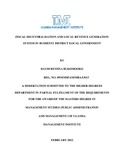| dc.contributor.author | BUKOMOOKO, DAVID BETIINA | |
| dc.date.accessioned | 2019-09-23T13:53:51Z | |
| dc.date.available | 2019-09-23T13:53:51Z | |
| dc.date.issued | 2012-02 | |
| dc.identifier.citation | Bukomooko, David Betiina (2012) Fiscal decentralisation and local revenue generation system in Bushenyi district Local Government | en_US |
| dc.identifier.uri | https://hdl.handle.net/20.500.12305/617 | |
| dc.description.abstract | The study investigated the relationship between fiscal decentralization and local revenue generation
system in Bushenyi District Local Government. The objective of the study was to examine the effect of
fiscal decentralization on the local revenue generation system in Bushenyi district local government.
The study took a case study design where both qualitative and quantitative methods of data collection
and analysis were used. Data was collected using questionnaire and interview guide. Both descriptive
and inferential statistical techniques of analysis were used. The study revealed that there is some good
enabling environment favourable for revenue generation. But even when this was so, revenue
generation in the district was found to be still very low. The study revealed that intergovernmental
transfer system contributes the biggest portion of the local revenue generation. The study confirmed
that intergovernmental transfers are regarded as the main source of revenue generation in the district.
This has enabled local governments to remain financially dependent on the central government. This
has not created good environment for fiscal decentralization to operate efficiently in generating of local
revenues to finance their budgets. The study concluded that intergovernmental transfer system in form
of conditional, unconditional and equalization grants contribute the biggest portion of the local revenue
generation to district local governments. The study recommends that intergovernmental transfers that
form the main revenue source to the district local governments should be reduced. This can be done by
building local capacity that will be enough to generate the main source of revenues to the districts.
Central government should also decentralize all the revenue sources to the district. This will enhance
the fiscal decentralization to the districts and promote financial autonomy from the central government.
This will enable the district local governments to be independent of the central government and be able
to make their own decisions based on local situation, be able to generate enough revenues and be able
to meet their own financial obligations. | en_US |
| dc.language.iso | en | en_US |
| dc.publisher | Uganda Management Institute | en_US |
| dc.subject | Fiscal Decentralization | en_US |
| dc.subject | Local Revenue Generation System | en_US |
| dc.subject | Local Government | en_US |
| dc.title | FISCAL DECENTRALISATION AND LOCAL REVENUE GENERATION SYSTEM IN BUSHENYI DISTRICT LOCAL GOVERNMENT | en_US |
| dc.type | Thesis | en_US |

